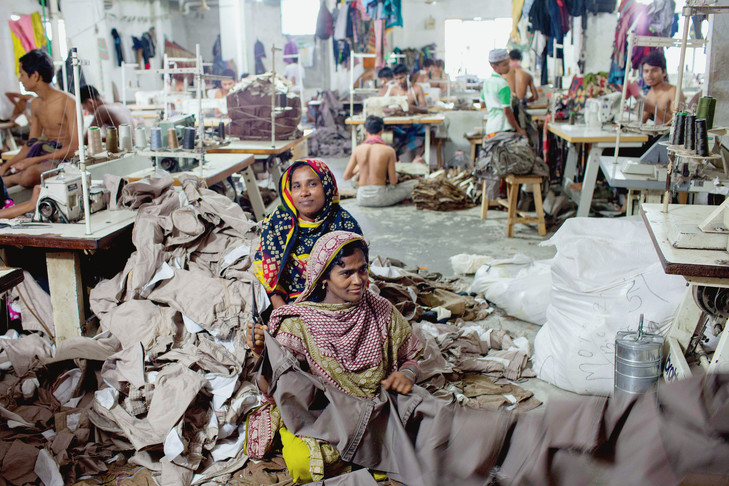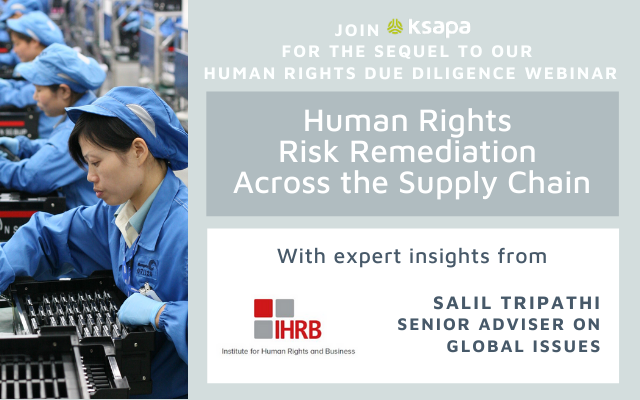The regulatory landscape is rapidly evolving on human rights risk remediation. While the general goal is to enforce mandatory due diligence across the supply chain, each new legal development with its own scope, impact and requirements. Ksapa recently held a webinar to explore solutions for businesses and investors to anticipate upcoming regulation and more proactively address their Human Rights risks amid the Covid-19 recession. Check out the replay on our website: learn more about the why… and what to do about it.
A Ksapa Webinar Exploring Solutions for Businesses and Investors to Navigate Regulations and Practices Amid the Covid-19 Recession
California, France, the United Kingdom, Australia and the Netherlands are often cited for having legislated on business and Human Rights. Further legally-binding instruments are under study at the multilateral and national levels – notably in Canada, Germany, Switzerland and Norway. Global regulators are doubling down on Human Rights due diligence, to ensure their instruments are at once legally-binding, cross-cutting and forward-thinking. Among other instances, the recent update on the UK Modern Slavery Act and EU Directive on mandatory Human Rights due diligence are more than likely to change how business and investors approach human rights risks – that is, with a performance obligation, not just best endeavors clauses. The UK Government indeed revisited its Act of 2015 to extend reporting requirements to all organizations with an annual budget of £36 million, public authorities and multinationals alike. In an effort to boost supply chain transparency, these Modern Slavery Act statements will be published on a publicly-available digital platform by 2021. Much in the same spirit, the European Commission announced a 2021 directive on mandatory Human Rights due diligence, which would cover both potential risk and actual Human Rights impacts. As a result, businesses would be expected to publicly report their results, mitigative efforts and impact on the ground – inclusive of enforcement mechanisms and access to remedy for victims through civil liability.
To discuss the rise of legally-binding human rights risk remediation instruments and solutions for businesses and investors to navigate new regulations amid the Covid-19 recession, Ksapa welcomed Salil Tripathi. A senior advisor with the Institute for Human Rights and Business, our panelist shared practical insights and solutions inspired by his experience with discrimination, human rights defenders and emerging trends in businesses and human rights. Salil Tripathi brings experience from across the board as they pertain to land rights, conflict resolutions and information and communication technologies. He specifically focuses on the impacts of investments in countries subject to long periods of political or economic isolation.
The Rise of Legally-Binding Human Rights Risk Remediation Instruments
An interesting parallel could be drawn between the surge of legally-binding Human Rights risk remediation instruments and the climate negotiations of the past few decades. It took several attempts before the 2015 Paris Agreement reached consensus: from then onwards, because climate warming impacts us all, businesses must do their part. The time is now ripe for a similar conversation on Human Rights and extending due diligence to the entire value chain. Here are 3 key levers to consider in the process:
- Multiple Stakeholders – While legally-binding instruments build upon the United Nations’ Guiding Principles on Business and Human Rights, they mean to move one step further. Like a driving license, due diligence mechanisms formalize the ground rules, so that with Human Rights violations as with a car accident, the responsibility falls squarely on the perpetrator. That said, a first layer of complexity arises from the vast diversity of stakeholders involved in structuring the international bill of rights, enforcing human rights and reporting on progress, for instance multinationals, multilateral organizations, local governments and non-profits.
- Finding leverage – Another issue is leverage, as it is frustratingly difficult to allocate responsibilities and impact on Human Rights, as demonstrated by the complexities of bringing justice to victims of Human Rights abuses. Given the increasingly intricate nature of global supply chains, neither geography, nor size or ownership matter when seeking to identify chokeholds in Human Rights enforcement. For instance, labor rights – and specifically banning child labor – do not hinge so much on the Code of Conduct of multinationals as much as on local cafés distributing their products and employing children in the process. Now that a relative consensus has been reached around criminalizing Human Rights violations, laws must be disseminated and adapted at the local level. Though essential to ensuring enforcement mechanisms are operational, this process makes proving complicity all the more difficult.
- Converging regulatory, litigation, disruption and reputational risks – Coalitions calling for mandatory human rights due diligence signal the private sector’s growing awareness of its obligations. Moving beyond self-regulation and voluntary reporting, businesses are indeed considering more holistic compliance and value chain management approaches via collaborative initiatives. For instance, a coalition of 26 companies, business associations and initiatives with an annual turnover of almost €350 billion issued such a call, followed by 105 investors representing $5 trillion in assets under management. The rationale is that mandatory due diligence as a non-negotiable standard of care would harmonize the current patchwork of requirements and increase legal certainty, which would ultimately level the playing field and boost industrial leverage across the value chain.
It could be said the Covid-19 pandemic, stop-and-go lockdown measures and ensuing recession have shed further light on the cost of inaction : at a time they can ill afford it, businesses face regulatory, litigation, business disruption and reputational risks. In that regard, enforcement and reporting are intimately linked. While complex, painstaking and expensive, reporting catalyzes a certain convergence of interests, to the extent companies understand the expectation of reporting and standards on Human Rights enforcement. All too often, however, do they report on processes rather than outcomes, given the major difficulty of tying a specific outcome to a given corporate initiative.
Typically risk-adverse companies will likely respond to mounting stakeholder pressure by arguing further human rights disclosure would only leave them open to more litigation. Dispelling the notion more reporting brings more charges, businesses should be encouraged to revisit their human rights policies, Codes of Conduct, due diligence and compliance procedures – and engage their entire supply chain in the process. Should litigation in fact emerge, a solid track-record on reporting Human Rights violations and risk remediation mechanisms conveys a factual account of corporate efforts and internal controls. Meanwhile, egregious human rights violations cases are getting their day in court. They could very win, further exemplifying the risk for companies unable to demonstrate the pertinence of their processes and veracity of reported outcomes.
3 Solutions for Supply Chain Management to Better Address Human Rights Amid the Covid-19 recession
That said, the road to granular risk analyses and effectively aggregating Human Rights data to report on is bumpy, particularly amid the current recession, prone to push business to cut costs rather than develop contingency plans. This brings Ksapa to suggest 3 solutions for supply chain management to better address Human Rights and anticipate these new regulatory developments.
In the early days of the pandemic, the United Nations called for a Human Rights approach to fighting COVID-19, to protect the universal right to life and secure access to healthcare for all. The pandemic not only preys on preexisting conditions and disproportionately affects the most vulnerable, lockdown measures and the ensuing recession could also push 100 million people into extreme poverty. In other words, the societal and economic crisis at hand is likely to jeopardize the rights of populations already marginalized or discriminated against – disabled people, indigenous communities, refugees and migrants, prisoners, the homeless… Cutting a through line across these vulnerable groups, women are most exposed, as caregivers and front-line workers. Given the breadth of the cross-section of the population Covid-19 puts at risk of losing their basic Human Rights, continuous development cannot possibly cut it. Here Ksapa offers 3 solutions for the private sector to focus on the most vulnerable as they devise plans to fight the pandemic induced recession.
Piecemeal action yields piecemeal results. The real question lies in business sharing its leverage across its value chain, to solidify organizations, technological innovation and health and safety performance. The global pandemic in fact generates even more of an onus on business to remedy endemic issues in good faith, with concrete progress on the ground, not just blanket statements on process. Here are a couple pointers for businesses and investors to proceed:
1. The SDG, A Comprehensive Framework For Comprehensive Action
- Align with the SDG Framework – The United Nations’ Sustainable Development Goals offer a range of key issues for businesses to take on a durable and unprecedented recession. The first step is to address the links between their socio-environmental impacts and economic activities. While they offer a fairly accessible and actionable framework, the SDG operate on a voluntary basis and the uptake from the private sector has been slow – even before the global pandemic. While the completion of these 17 goals would certainly be supportive of Human Rights, businesses must come to respect rightsholders as a legal and moral obligation.
- Work at the interface of sensitive issues – In the case of Human Rights, good deeds do not to compensate victims of wrongdoing. Tackling the issue of women on the frontlines of the pandemic response is indeed not a case of flexible work schedule, or paid leave or healthcare, but all of the above. This entails a broader mobilization on poverty, access to quality education, gender equality, sustainable cities and local communities. Business must in turn comply with intersecting directives and mandatory practices, to address interconnected SDG issues.
- The devil is in the details – In the face of various threats, businesses must not only make up for lost time, they must also catch up to their moral and legal imperative to enforce Human Rights. The key word here is granularity, where corporate support of communities and suppliers must be compounded with a precise understanding of urgent needs. Beyond prioritization efforts, companies must seek the voice of vulnerable segments they tend to overlook in their conventional engagement efforts. For example, securing a vaccine rests on testing, forcing the pharmaceutical industrial to anticipate the ethical implications of sourcing volunteers among the most vulnerable, either willing to trade off their rights for compensation or coerced to do so.
2. Prioritize Strategic Categories
In light to the spread of Covid-19 more than ever, companies should be encouraged to work with their most strategic and vulnerable suppliers. Here are 3 intertwined options to bear in mind:
- Long-term vision – As the looming recession generates knee-jerk cost-cutting reactions, there is no vaccine in sight. Businesses will therefore have to embed major uncertainty in the way they balance conventional crisis management and long-term investment to offset a durable recession. Indeed, consider lessons from the 2008 subprime crisis would guide the private sector toward alternatives to layoffs and cancelling orders.
- Securing supply – Focusing on workers and suppliers across the supply chain, companies may join collective initiatives to share the means to innovate, boost product quality and offer timely deliveries… all proven solutions to come out roaring of the present recession.
- Activating contingency plans across the value chain – The current recession demands a profound transformation of businesses, starting with working with suppliers to make the necessary investments and adapt production facilities. Left to their own devices, Tier 2 and 3 suppliers will likely struggle to align the required capital and expertise. In line with the SDG Framework and owing to their supply continuity imperative, such an approach would see businesses map their strategic suppliers and match the appropriate capacity-building and equipment investments – both at the group and local levels.
3. Embrace Big Data, Digital Collection and Virtual Reality
One crisis pilling up another has only produced more complexity. Already before the Covid-19 crisis, businesses had been grappling with the SDG Framework, bold sustainable transition strategies and vulnerable stakeholder engagement. Digital tools offer the following advantages:
- Managing complexity – Digital innovations help businesses manage complexity at an acceptable cost. For example, businesses able to combine machine learning capabilities and contextual data may reliably predict risks and direct remediation efforts accordingly. Digital technologies could also streamline data collection across global supply chains and reinforce face-to-face coaching and mentorship, on top of localized knowledge transfer.
- Balancing contrary injunctions – The call for granular Human Rights risk analyses must be modulated in the face of equally pressing data privacy regulatory developments. That said, applying digital solutions to stakeholder engagement efforts allows businesses to develop long-term relationships with multiple and diverse stakeholders and communicate with them in an adapted and the more convincing manner. For instance, as policy-makers develop new tools to address the diverse range of sexuality and gender identity, so must businesses, with the added difficulty of delving into the intimacy of their workers. To that end, businesses are considering persona spectrums as a way to outline group motivations, contexts, abilities and circumstances, while also allowing for individual behavior and situational variations. Covid-19 having isolated disabled individuals, personas could likewise help business reassess their product designs and develop inclusive environments.
- Bearing in mind Human Rights risks – Applying digital solutions to societal issues, not just tracing sensitive commodities, exemplifies the difficulty of balancing granular analysis and Human Rights enforcements. Applications have notably helped government trace the spread of Covid-19, with telecom enterprises monitoring traffic to develop heat maps. Covid-19 having durably fragilized world economies, businesses must be particularly warry of empowering discriminatory practices or state-sponsored persecutions. The recession indeed warrants event more contractual safeguards against data misuse as part of a broader mobilization to enforce Human Rights both on and offline.
Conclusion | (High) Time for Action
Ksapa encourages businesses to step up their Duty of Care plans by comprehensively mapping their Human Rights risks across their operations, supply chains, communities and customers – and rolling-out enforcement mechanisms accordingly. This may call for expert input, to help companies and investors consider how to uphold their commitment to sustainable change, who they will place in charge to manage it and which metrics they will use to monitor and demonstrate progress. Ksapa combines sustainability advisory and impact investment, by structuring innovative financing schemes to align multiple stakeholders and finance adaptative measures at scale. Be sure to reach out to us to learn more about federating the substantial resources human risk remediation measures require.
***
Ksapa is a reference platform committed to advancing the issues of human rights, climate and circularity within the international business and investor communities. More than 150 international practitioners joined us to consider issues as sensitive and complex as Human Rights risk remediation amid the current recession, including Air Liquide, Airbus, Axa, BlackRock, BNP Paribas, BP, BPCE Group, Bureau Veritas, Cap Gemini Invent, CMA-CGM, the Coca-Cola Company, Crédit Agricole, Crystol Energy, Danone, Delta Airlines, DNCA Finance, EDF, Edmond de Rothschild Private Equity, Engie, Eni, FFA Assurance, Foncia, HSBC, Huawei Technologies, Investment One, Kering, La Banque Postale, L’Oréal, the Makesense Seed Fund, McCain Foods, Mondelēz International, Morgan Stanley, Multiplex, Nexans, Novo Nordisk, PVH Corp, Rio Tinto, Saltus Consulting, Sanofi, Sarasin UFG, Schlumberger, Schneider Electric, Shell, SNCF, Société Générale, Sodexo, Telefonica, the Walt Disney Company, Total and Upfield. They were joined by consultants, academics, multilateral organizations and non-profits the likes of Ashoka, the ChangeNOW Summit, ESSEC, the French Development Agency, the Harvard Belfer Center, HEC Paris, the MEDEF, Novethic, the OECD, the ORSE, the Principles for Responsible Investment, the Sustainable Purchasing Leadership Council, the UN Environment Programme, the UN Human Rights Working Group, the Paris-Saclay University, the World Business Council for Sustainable Development and the World Resources Institute.
As a sustainability and corporate responsibility consultant, Margaux joined Ksapa with international experience in public, private and non-profit organizations. She had previously worked for the Deloitte and Quantis sustainability consultancies, lobbied for environmental research on behalf of the INRA and contributed to Total’s extra-financial reporting.
A Franco-American citizen, Margaux holds sustainability certifications from the IEMA and Centrale-Supélec on top of a Masters degree in History, Communications, Business and Internal Affairs.
She is fluent in French, English and Spanish.







